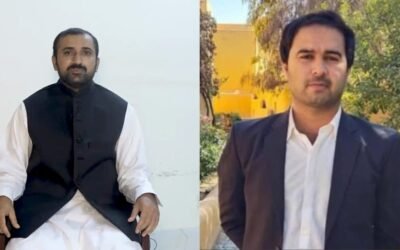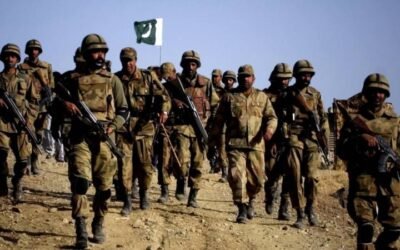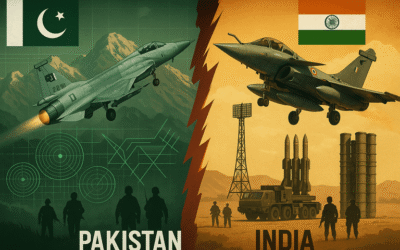Pakistan is a nation with diverse cultures, languages, sects, and ethnic groups. This diversity ought to be an asset, but there are both internal and external forces that are exploiting this diversity to disintegrate the people through hate and misinformation. This strategy is referred to as information warfare, in which social media, fake news, and online propaganda have been employed to generate distrust among various communities.
Such a kind of digital attacks has been on the increase in Pakistan in recent years, particularly to undermine national unity by attacking sectarian, ethnic, and provincial identities. A 2020 report by the EU DisinfoLab found that over 750 fake media sites had been used to publish anti-Pakistan content over the past 15 years, and had contributed both to division and misinformation around the world.

Source : disinfo
The Tool of Fragmentation
Information warfare implies the use of untrue, misinformative, or even harmful information to manipulate the thoughts of people, instill fear, or cause conflict. It employs words, pictures, and videos, which are frequently distributed online and through social media such as Facebook, Twitter (X), YouTube, and WhatsApp. Such methods are applied in Pakistan to promote sectarian hatred, ethnic discrimination, and provincial prejudice to polarize the society.
These messages are usually sent by bogus social media accounts, bots, or foreign-funded networks. Another factor aggravating the problem is the use of social media algorithms to popularize sensational and emotional content, which travels quickly because of the low digital literacy and absence of fact-checking. Rather than encouraging people to come together, these platforms are today being used to spread fear and widen the social divide.
Sectarian Fault Lines
Courtesy of The Diplomat

Source : The Diplomat
Sectarianism between the Sunni and Shia is a sensitive matter in Pakistan. Regrettably, the issue has been aggravated by the use of information warfare to publish hate speech and fake religious news, as well as provocative videos on social media. When religious holidays such as Muharram come, online portals are usually congested with posts that either insult or distort the religious practices of the other sects. To give an example, fake news and manipulated videos are posted to present Shia beliefs as insulting, which results in anger and even violence in the real world.
During the major religious months, online sectarian hate speech was more than 40 percent. Such polarizing messages tend to be boosted by nameless or outlandish accounts, and evidence of systematic actions can be observed. Some sectarian pages and WhatsApp groups were run by external actors to create unrest in sensitive areas. Other such campaigns have been traced to foreign intelligence networks that seek to weaken Pakistan by pitting its citizens against one another along religious lines.
Polarization by Ethnic and Provincial Propaganda
Pakistan has a lot of ethnic groups, such as Punjabis, Pashtuns, Baloch, Sindhis, and Mohajirs. The concept of ethnic diversity is a part of the Pakistani identity, but it is also being used in online propaganda to fuel confusion, hatred, sectarianism and regional prejudice. Hundreds of bogus websites and non-governmental organizations were found promoting separatist slogans and aiming at the ethnic harmony of Pakistan in a long-term operation called Indian Chronicles.
In the same way, malicious players disseminate misinformation to demonstrate that some provinces are ignored or suppressed. All these strategies are to break national cohesion by enhancing distrust between the center and the provinces. Even local political parties sometimes get into this trap and keep repeating such narratives to ensure that they win the support of people, not knowing that they are assisting enemies in tearing the country apart.
Political and Strategic Reasons for Division
The dissemination of hate and division by means of information warfare is not an accidental activity, but it is undertaken with direct political and strategic objectives. In Pakistan, sectarian or ethnic discourses are employed by some political groups either to enlist popular support, attack opponents, or evade governance concerns. As an illustration, some parties or their patrons in times of elections or protests would, through social media, brand others as traitors, foreign agents, or part of a sectarian community to make the masses go against them. This not only divides but also destroys trust in democratic procedures.

Source : carnegieendowment
Conversely, aggressive foreign states, particularly India, employ their disinformation tactics to weaken Pakistan internally. The Ministry of Foreign Affairs of Pakistan has already introduced several dossiers and press briefings, in which they demonstrate how India is engaged in financing and controlling fake news networks, negative stories about Pakistan, and cyberattacks on national institutions. Such maneuvers are aimed at undermining the unity of Pakistan, causing turmoil, and decreasing the trust of the population towards the government, military, and media.
Source : ipripak
Implications on National Security
Information warfare that spreads hate speech, fake news, and divisive narratives has dire implications for the security and social peace in Pakistan. The belief and dissemination of false information that attacks other sects, ethnicities, or provinces leads to mistrust, fear, and hatred when people begin to believe and spread false information. That undermines the unity of the nation and may result in actual violence, protests, and even the recruitment of terrorists.
In the case of sectarian hate speech that becomes viral online, may lead to attacks on religious meetings or places of worship. In the same way, propaganda on an ethnic basis may cause inter-provincial tensions or hatred towards the federal government, thus causing radicalization and extremism, especially among young people who are easily influenced. Such digital threats not only damage the reputation of Pakistan in the world but also complicate the process of ensuring law and order within the country.
As an example, in September 2020, sectarian tensions in Karachi dramatically increased following a wave of provocative and insulting videos against the religious beliefs of Shia. This led to violent demonstrations, and the situation got so bad that police units were called to calm down some of the sensitive areas to avoid confrontations. Several FIRs were registered against the hate speech propagators and sectarian violence inciters using online mediums.
Strategic Way Forward
- Digital Literacy and Public Awareness: Pakistan needs to initiate massive digital literacy programs to inform citizens on fake news, hate speech, and divisive content. This will enable citizens to be critical in their thinking before sharing or believing in the harmful online content.
- Enhance Cyber Surveillance and Control: The control agencies, such as NACTA and PTA, should employ sophisticated cyber tools to track the online platforms and block the accounts or pages that promote sectarian or ethnic hatred. Social media operators should also be held responsible under the Pakistan cyber laws.
- Develop a Common National Response Mechanism: A combined digital coordination cell needs to be developed between the civilian, intelligence, and military agencies to monitor and counter disinformation campaigns. This cell would also develop and propagate counter-narratives that are based on facts to safeguard social unity.
Conclusion
Nowadays, it is not only the weapons that are being used as the tools of war, but also the words, lies, and narratives. Pakistan is not only being attacked on the borders but also on the screens. The information war is quietly ripping the fabric of social cohesion by pitting communities, sects, and provinces against one another. But this menace can be crushed by truth, education, cohesiveness, and cyber power.





























